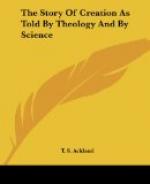Before we enter upon a detailed examination of the records of the several days, there are two preliminary points to which attention must be directed. We shall have to make frequent reference to “law.” It will be well that the sense in which the term is used should be made clear. The account of the First Day’s Work will lead to the recent theory of the Correlation of Forces. As this is probably a new subject to many, some previous explanation of it will be necessary.
Section 1. Of law. [Footnote: This subject is fully treated in the Duke of Argyll’s “Reign of Law.”]
Law, in its original and proper sense, is the expression to an inferior of the will of a superior, which the inferior has it in his power to obey or to resist, but resistance to which entails a penalty more or less severe, in proportion to the moral turpitude, or the injurious consequences of the act of disobedience. In this its strict sense the law can only exist in connection with beings possessed of reason to understand it, of power to obey it, and of free will to determine whether they will obey it or not. When these three conditions are absent law can have no existence. But the result of perfect law, perfectly obeyed, would be perfect order. Hence the observation of perfect order leads, by a reversed process, to the supposition of some law of which that order is the result. Hence arose in the first instance the term “natural laws,” or “laws of nature.” Events were found to follow each other in a uniform way, and this uniformity was thus sought to be accounted for. Probably in the minds of those by whom the word was thus applied in the first instance Nature was not the mere abstraction it is now, but an unseen power—Deity or subordinate to Deity— working consciously and with design.
[Footnote: Mr. Darwin, especially in the “Origin of Species,” seems continually to betray the existence of this feeling in his own mind. Though he from time to time reminds us that by Nature he means nothing but the aggregate of sequences of events, or laws, he yet frequently speaks of Nature in a way which is applicable only to an intelligent worker.]




